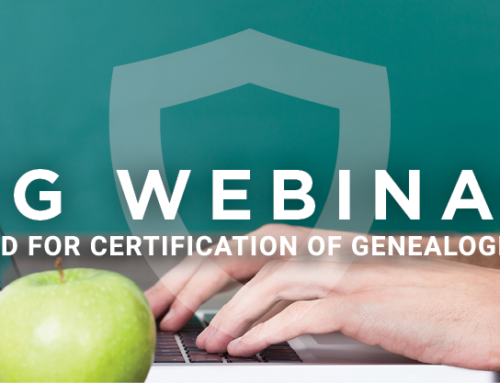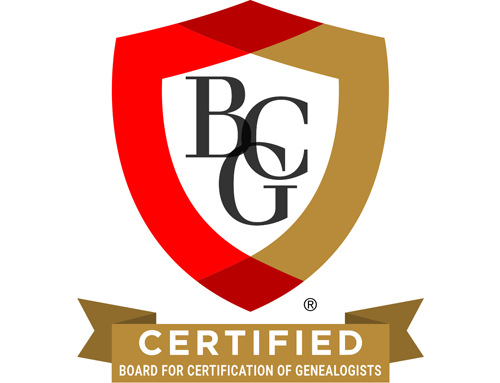We can’t stick our heads in the sand any more when it comes to learning about using DNA testing in genealogical research. Millions of people are taking DNA tests, and many (ourselves included) will need help understanding test results. Additionally, we must at least consider genetic genealogy as part of our reasonably exhaustive research. Not all projects require DNA testing, but some will benefit from it, and others will be difficult to pursue without it. We can’t ignore the value of genetic testing as a research tool. Let’s learn how to use it!
In informing ourselves about DNA testing we also meet continuing education standards. The two knowledge and skill development standards apply to genetic genealogy as well as to document-based work.
82. Development goals. Genealogists improve and update their (a) attainment of genealogical standards, (b) knowledge of genealogically useful materials and contexts, (c) skills in reconstructing unknown or forgotten relationships, families, people, groups, and events, and (d) abilities to present their findings to others.[1]
83. Regular engagement. Genealogists engage in formal or informal development activities, or both, on an ongoing basis:
- Formal development activities include attending conference, seminar, and workshop presentations … participating in classroom-based or online courses of study; and engaging in virtual or in-person structured study groups, webinars, and similar venues.
- Informal development activities include conducting genealogical research of increasing difficulty, consulting with advanced practitioners, [etc.].[2]
Here are many options for both self-directed and guided genetic genealogy education. A huge thank-you to Blaine Bettinger, PhD, JD, for assembling and providing the second part of this post. Debbie Parker Wayne, CG, and Judy G. Russell, JD, CG, also made helpful contributions.
There are two main ways to learn about DNA; self-education and organized courses or institutes. In the “early days” of genetic genealogy, the only option was self-education. Today there are numerous options for professionals to learn about genetic genealogy.
Genetic Genealogy Self-Education
1. The single best way to learn about genetic genealogy is the hands-on approach: test yourself and numerous family members, and then explore the results using the tools at the vendor(s)’ website.
2. Books and articles are a good way to gain a basic understanding of the fundamentals of genetic genealogy.
Association of Professional Genealogists. Quarterly. https://www.apgen.org/publications/quarterly/archives/1979-2014SeptAPGQindex.pdf, 23–24 (DNA) and 30 (Genetic Genealogy). A regular feature begun in March 2014 follows good pieces published earlier.
Aulicino, Emily D. Genetic Genealogy: The Basics and Beyond. Bloomington, Ind.: AuthorHouse, 2013.
“Chromosomes and Inheritance.” University of Utah. Learn.Genetics: Genetic Science Learning Center. http://learn.genetics.utah.edu/content/chromosomes/.
Dowell, David R. NextGen Genealogy: The DNA Connection. Santa Barbara, California: Libraries Unlimited, 2014.
Fitzpatrick, Colleen, and Andrew Yeiser. DNA and Genealogy. Fountain Valley, California: Rice Book Press, 2005.
Hill, Richard. Guide to DNA Testing: How to Identify Ancestors and Confirm Relationships through DNA Testing. 2009. Kindle edition. http://www.dna-testing-adviser.com/DNA-Testing-Guide.html.
Kennett, Debbie. DNA and Social Networking: A Guide to Genealogy in the Twenty-First Century. Gloucestershire, UK: The History Press, 2011.
National Genealogical Society Magazine. http://www.ngsgenealogy.org/cs/members_only/publications_archive/magazine_online/magazine_archives?null (members only). See Oct-Dec 2011 (Judy G. Russell), Oct-Dec 2013, Apr-Jun2014, and regularly beginning July-Sept 2014 (Debbie Parker Wayne).
Smolenyak, Megan Smolenyak, and Ann Turner. Trace Your Roots with DNA. Emmaus, Penn.: Rodale Press, 2004. Discusses Y-DNA and mtDNA; published before widespread atDNA testing, but useful general introduction to genetic testing.
Wayne, Debbie Parker. http://debbiewayne.com/presentations/gatagacc_biblio.php. This site lists print and online educational publications by Debbie and others she recommends.
3. Blogs, forums, and mailing lists help us stay on top of the newest developments. Often news is shared the very same day it is available. Here is an essential list of blogs, forums, and mailing lists for the professional genetic genealogist.
Essential Blogs:
23andMe. The 23andMe Blog. http://blog.23andme.com/.
AncestryDNA. Articles About AncestryDNA. http://blogs.ancestry.com/ancestry/category/dna.
Aulicino, Emily. DNA—Genealem’s Genetic Genealogy. http://genealem-geneticgenealogy.blogspot.com.
Bartlett, Jim. Segment-ology. http://segmentology.org.
Bettinger, Blaine. The Genetic Genealogist. http://www.thegeneticgenealogist.com.
Christmas, Shannon. Through the Trees. http://throughthetreesblog.tumblr.com.
Cooper, Kitty. Kitty Cooper’s Blog: Musings on Genealogy, Genetics, and Gardening. http://blog.kittycooper.com.
Dowell, David R. Dr D Digs Up Ancestors. http://blog.ddowell.com.
Estes, Roberta. DNAeXplained—Genetic Genealogy. http://dna-explained.com. This post discusses genetic genealogy educational opportunities: http://dna-explained.com/2015/11/12/dnaexplained-archives-educational-opportunities/.
Moore, CeCe. Your Genetic Genealogist. http://www.yourgeneticgenealogist.com.
Owston, Jim. The Lineal Arboretum. http://linealarboretum.blogspot.com/.
Russell, Judy G. The Legal Genealogist. http://www.legalgenealogist.com.
Wayne, Debbie Parker. Deb’s Delvings in Genealogy. http://debsdelvings.blogspot.com.
Some Essential Forums and Mailing Lists:
“DNAAdoption.” Google Groups. https://groups.google.com/forum/#!forum/DNAAdoption/join.
“DNA Detectives.” Facebook.https://www.facebook.com/groups/DNADetectives/. The group is closed, with membership by application.
DNA: GENEALOGY—DNA mailing list.
http://lists.rootsweb.ancestry.com/index/other/DNA/GENEALOGY-DNA.html.
“DNA-NEWBIE.” Yahoo! Groups. https://groups.yahoo.com/neo/groups/DNA-NEWBIE/info.
“International Society of Genetic Genealogy (ISOGG).” Facebook. https://www.facebook.com/groups/isogg. The group is closed, with membership by application.
International Society of Genetic Genealogy [ISOGG] Wiki. http://www.isogg.org/wiki/Wiki_Welcome_Page. This is an essential resource. Although this Wikipedia-style source of information is curated by volunteers, it contains some of the most sophisticated and detailed analysis of genetic genealogy. The following pages, for example, are among those absolutely essential for every genetic genealogist:
- “Autosomal DNA Statistics.” http://www.isogg.org/wiki/Autosomal_DNA_statistics.
- “Autosomal DNA Testing Comparison Chart.” http://www.isogg.org/wiki/Autosomal_DNA_testing_comparison_chart.
- “Identical by Descent.” http://www.isogg.org/wiki/Identical_by_descent.
- “X-Chromosome Testing.” (http://www.isogg.org/wiki/X-chromosome_testing.
- “Genetic Genealogy Resources.” (http://www.isogg.org/wiki/Wiki_Welcome_Page). More genetic genealogy educational opportunities.
Genetic Genealogy Educational Courses and Institutes
1. Instructor-led courses and institutes include but are not limited to the following. Some of the advanced courses and tools courses have prerequisites.
DNAAdoption. http://dnaadoption.com/index.php?page=online-classes. While its main focus is providing DNA information for adoptees, it offers several online courses for genealogists as well.
Family Tree University. https://www.familytreeuniversity.com/. FTU offers beginning Genetic Genealogy 101 and Genetic Genealogy 201 courses.
Genealogical Research Institute of Pittsburgh (GRIP). http://www.gripitt.org. In the summer of 2016, GRIP is offering two weeklong courses, “Practical Genetic Genealogy” and “Advanced Genetic Genealogy.”
Institute of Genealogy and Historical Research (IGHR). http://samford.libguides.com/ighr. In the summer of 2016, IGHR is offering a weeklong “Genetic Genealogy Tools & Techniques” course.
Salt Lake Institute of Genealogy (SLIG). http://ugagenealogy.org. In January 2016 SLIG is offering two weeklong courses, “Beginning Genetic Genealogy” and “Advanced DNA Analysis Techniques for Genealogical Research.”
Virtual Institute of Genealogical Research. http://vigrgenealogy.com/. VIGR offers several levels of genetic genealogy courses online. Most are recorded and can be accessed after the live air dates at http://vigrgenealogy.com/store/. “(Finally!) Understanding Autosomal DNA” is available now. New courses are added periodically.
2. Lectures and webinars
DNA is a now a very popular topic at every major genealogy conference in the United States, with some conferences offering one or more DNA-focused days. Here are nationally recognized speakers and presentations.
Bettinger, Blaine. http://www.thegeneticgenealogist.com/presentations/.
Bush, Angie. http://www.genesandtrees.com/upcoming-events-and-presentations.html.
“FamilyTreeDNA.” YouTube. https://www.youtube.com/channel/UCGXMVPJ5TBwcIvvRt3XWpDw. FamilyTreeDNA webinars have been archived at this free site.
Gleeson, Maurice. http://dnaandfamilytreeresearch.blogspot.com/p/presentations-downloads.html.
Moore, CeCe. http://www.yourgeneticgenealogist.com/p/in-person.html ; resources: http://www.yourgeneticgenealogist.com/p/resources.html.
Russell, Judy. http://legalgenealogist.com/lectures/upcoming.
Southard, Diahan. http://www.yourdnaguide.com/lecture-schedule/.
Wayne, Debbie Parker. http://debbiewayne.com/index.php.
CG, Certified Genealogist, CGL, and Certified Genealogical Lecturer, are service marks of the Board for Certification of Genealogists, used under license by Board-certified genealogists after periodic competency evaluation, and the board name is registered in the US Patent & Trademark Office.


